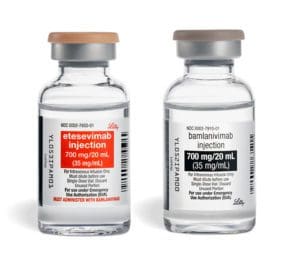
U.S. government authorities have decided to immediately pause the distribution of Eli Lilly’s bamlanivimab and etesevimab over concerns that the monoclonal antibody cocktail is ineffective against some SARS-CoV-2 variants.
CDC recently concluded that the Gamma variant (P.1) and the Beta variant (B.1.351) make up 11% of COVID-19 infections. They are also continuing to become more dominant, as is the Delta variant (B.1.617.2). CDC has determined that the Delta variant is possibly less responsive to some monoclonal antibody treatments.
The Beta and Gamma variants are significantly less responsive to bamlanivimab and etesevimab than other viral lineages.

Bamlanivimab and etesevimab image courtesy of Lilly.
FDA is recommending Regeneron’s REGEN-COV and GSK’s sotrovimab as more robust antibody therapies.
In related news, FDA recently granted emergency use authorization to tocilizumab, a monoclonal antibody from Roche.
In April, FDA had revoked the emergency use authorization for bamlanivimab alone as a COVID-19 treatment, recommending the combination of bamlanivimab and etesevimab instead.